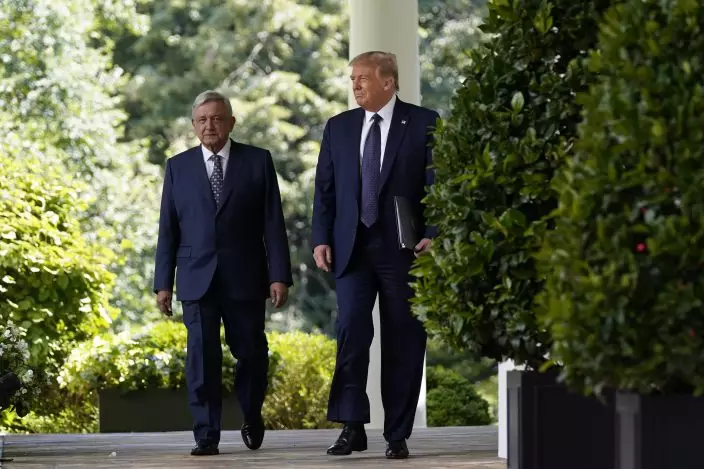The Supreme Court agreed on Monday to review a Trump administration policy that makes asylum-seekers wait in Mexico for U.S. court hearings.
As is typical, the court did not comment in announcing it would hear the case. Because the court's calendar is already full through the end of the year, the justices will not hear the case until 2021. If Joe Biden were to win the presidential election and rescind the policy, the case would become largely moot.
President Donald Trump's “Migrant Protection Protocols” policy, known informally as “Remain in Mexico,” was introduced in January 2019. It became a key pillar of the administration’s response to an unprecedented surge of asylum-seeking families at the border, drawing criticism for having people wait in highly dangerous Mexican cities.

FILE - In this June 23, 2020 file photo, President Donald Trump holds an image of the U.S. border wall being built between the U.S. and Mexico as he participates in a border security briefing at United States Border Patrol Yuma Station in Yuma, Ariz. The Supreme Court is agreeing to review a Trump administration policy that makes asylum-seekers wait in Mexico for U.S. court hearings. As is typical, the court did not comment Monday in announcing it would hear the case. Because the court’s calendar is already full through the end of the year, the justices will not hear the case until 2021. (AP PhotoEvan Vucci)
Lower courts found that the policy is probably illegal. But earlier this year the Supreme Court stepped in to allow the policy to remain in effect while a lawsuit challenging it plays out in the courts.
More than 60,000 asylum-seekers were returned to Mexico under the policy. The Justice Department estimated in late February that there were 25,000 people still waiting in Mexico for hearings in U.S. court. Those hearings were suspended because of the coronavirus pandemic.
In a statement after the high court agreed to take the case, Judy Rabinovitz, an attorney for the American Civil Liberties Union, which is challenging the policy, called the policy “illegal and depraved."

FILE - In this July 8, 2020 file photo, President Donald Trump and Mexican President Andres Manuel Lopez Obrador arrive for an event in the Rose Garden at the White House in Washington. The Supreme Court is agreeing to review a Trump administration policy that makes asylum-seekers wait in Mexico for U.S. court hearings. As is typical, the court did not comment Monday in announcing it would hear the case. Because the court’s calendar is already full through the end of the year, the justices will not hear the case until 2021. (AP PhotoEvan Vucci)
"The courts have repeatedly ruled against it, and the Supreme Court should as well,” she said.


